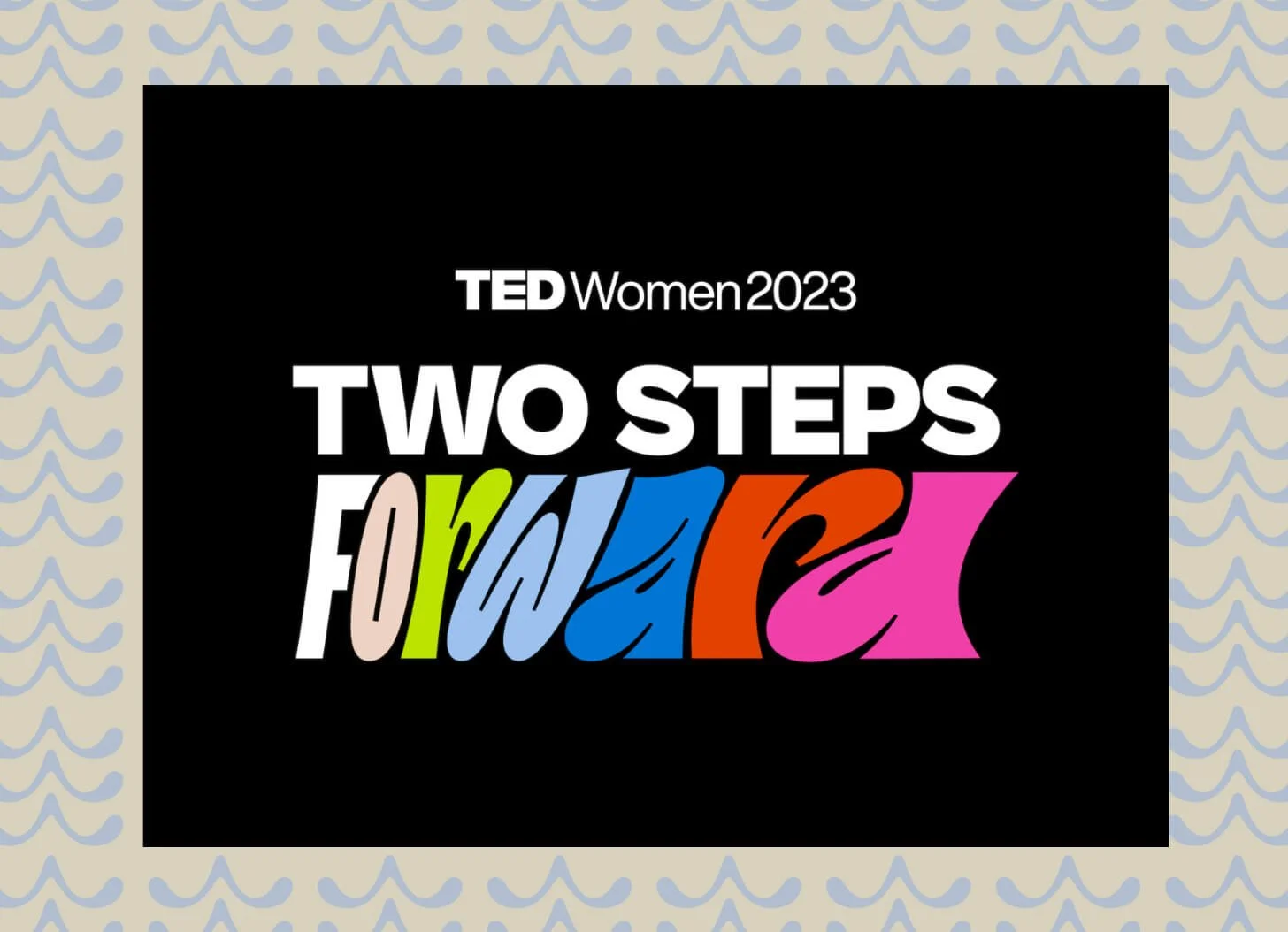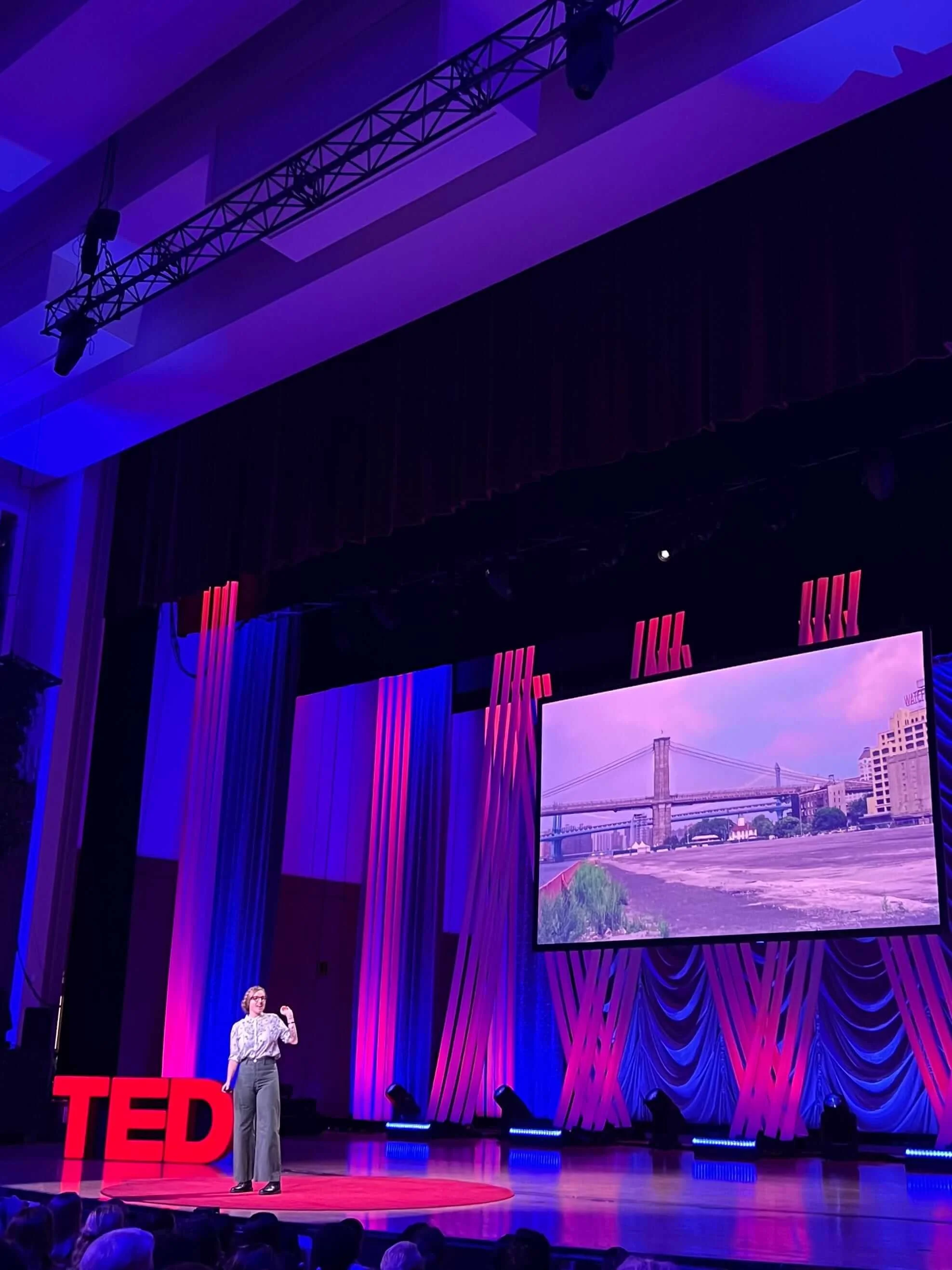Musings on TEDWomen
Expanding Leadership and Investment in Women
Arriving home from a 3-day long TED Women’s conference and being asked HOW WAS IT has led to me to the same reaction that I have when folks ask me HOW WAS ANTARCTICA?
Where on earth do I begin? How can I summarize what was a fully immersive 72-hour experience lighting up cognitive, social and at times, physical (DM me for my step count!) brainwaves?
After serving up many insufficient answers, I thought I’d give TED Women its proper moment in the sun here on the blog.
Why I Attended TEDWomen: Seeking Alignment and Expansion
When I set out to attend this conference, my intention was to meet people who aligned with my mission to empower and invest in women and to expand my mind – working from home had led me feeling a bit stagnant. TED, which is known for giving a stage to some of the most interesting voices across a dizzying list of disciplines, seemed like the perfect cure.
The Conference
All TEDWomen Attendees donned name tags designed to grant conference access and spark connection. Conversations started in line at the bathroom, at the always-abundant snack bar and while wandering around the highly curated exhibits. They were often inspired by the “Ask Me About” section, where women flashed anything from their hobbies, to professional expertise to personal growth goals. My first conversation at TED was at the food trucks (clearly) with a woman whose “Ask Me About” read getting comfortable using my voice.
I could relate. Using my voice has been a personal goal of mine the last few years. It’s inspired me to speak up, return to writing, share my thoughts, and build Matria. As it happens, the woman I met was using her voice for a similar mission: to create a professional networking community for women. Needless to say, it was one of many synchronicities at this event.
At 5pm sharp, we assembled at the main stage for “A World View.” Class was officially in session. We heard from Irish war reporter Jane Ferguson on the way women are humanizing war reporting; activist and student Dasha Navalnaya on her courageous campaign to release her imprisoned father, Russian opposition leader Alexey Navalny; and Christine Schuler Deschryver on how she’s dedicating her life to healing and empowering women in the Democratic Republic of Congo, to name a few. The talks were heavy, heartbreaking, inspiring and informative.
The following morning, we had our choice of activities and discovery sessions. I was drawn to “The Inner Journey to Conscious Investing,” which was being led by a recent connection I made back in New York.
I walked into an intimate room and was met with thirty women who all just so happened to align with my mission. We reflected on our relationship with money (I’ll save that story for another day!) and questioned why it all mattered and how much is enough? This exercise was the primer for the inspiring dialogue that ignited across the room. Industry experts shared their visions for allocating more capital to women. Grievances were aired. Brains were stormed. Stats were surfaced. And just like that, the collective genius of 30 interdisciplinary women, connected by a shared mission, metaphorically solved the financial crises plaguing women.
The key takeaways:
When women lead, we all win. From leaders investing in their people to mothers prioritizing care for their families and communities, we’re all better off when women allocate money
The venture capital system is full of inherent bias and systemic issues that impede female founders from fundraising
If women invested at the same rate as men, there would be an extra $1.87 trillion of additional inflows into socially responsible investments
There are a lot of smart women working on increasing the flow of capital to women, yet they seem often siloed. There is a need for collective action to work towards gender equality.
I’m looking forward to keeping in touch with this community and continuing the conversation on how to get more money in the hands of women. If this topic interests you, get in touch!
Key Talks That Redefined Leadership
To save this post from being 400 pages long, I’ll highlight the three TED talks that have lingered with me since the conference earlier this month:
A ‘former’ First Lady: Irina Karamanos Adrian’s partner, Gabriel Boric, took office as President of Chile in March of 2022. When he was elected, Irina was set to assume political power by way of tradition and marriage. Rather than simply assume the role of First Lady, she accepted the role with a vision to change it. Over the next year, she dismantled the office of the First Lady, driven by what she called the “democratic illegitimacy of having the institution of marriage embedded in State,” and the gender bias inherent in the figure of the First Lady. From Irina’s TED talk:
“We still look at masculine authorities as people that need to be complimented by a feminine other. But (...) we expect her [a woman in power] to have both male and female qualities. ”
And that’s the line that has lingered. I’ve long known that women in power are held to a higher standard and are expected to be all things to all people. “It’s literally impossible to be a woman” (thank you, Barbie!) Yet men are allowed a partner to be considered as whole.
Dismantling the culturally and traditionally significant office required a clear vision and a lot of courage. I saw Irina at the welcome party while strategizing how to get food (again, clearly) and congratulated her on having the courage to bring her bold vision to life. I could sense she was still processing all the change she made. She had poured all her energy into this transformative vision, which proved to be a grueling and tiring experience. It had left her tired, perhaps burned out.
The role of the First Lady has certainly crossed my mind. When I think of this role in the U.S, I immediately think of the highly important tasks like choosing china, redecorating an already-perfectly appointed White House and carefully curating a personal wardrobe. What are we saying about gender roles and relationship dynamics by keeping this office in place?
Our current administration saw the first male spouse of an American President or Vice President, creating the first Second Gentleman of the United States. Progress? Perhaps. But even while creating space for a woman in power, we’re allowing men to redefine this role. As Douglas Emhoff, husband of VP Kamala Harris noted, he’s up to more important tasks than selecting china.
It was an honor to meet Irina, and to hear her courageous story of challenging how marriage and gender norms are embedded in politics.
A horticulturalist beautifying Brooklyn: On a lighter note, we heard from Rebecca McMackin, a horticulturalist who spent a decade beautifying Brooklyn Bridge Park. With the proliferation of wildflower lawns, I was excited to learn how gardening could combat climate change. In the late 2010s, Brooklyn Bridge Park underwent a significant transformation. I just so happened to live down the street from the park at the time and witnessed the late stage of this transformation, with the construction of 1Hotel, the opening of Piers 5 and 6, and eventually, one15 Brooklyn Marina. An abundance of plants and greenery started filling in on both sides of the newly paved paths, transforming the landscape. With the views of Manhattan, waterfront access and lush greenery, it’s one of the most beautiful parks in New York.
Rebecca shared that by prioritizing native plant species, they in turn increased biodiversity in the parks. What was once concrete, was now a breeding ground for rarely found birds, insects and even a two-spotted ladybug. Thank you Rebecca for helping create such a beautiful place in New York.
An impact Venture Capitalist: Finally, Freada Kapor Klein, founder of Kapor Capital, shared how her social impact venture capital firm is redefining venture capital. Freada Kapor Klein co founded Kapor Capital with a big mission: to make venture-scale returns with portfolio companies whose core business closed gaps of access, opportunity or outcome for low-income communities and/or communities of color.
Kapor Capital had to rethink how venture capital works to bring this to life. They had to redefine how they evaluate talent and how they find the right businesses to invest in. My favorite takeaway: rather than evaluating entrepreneurs on their credentials and traditional pedigree, they evaluate talent based on “distance traveled.” Kapor Klein explains this as “where you started in life, and how far you got on your own steam.” It’s a great model to employ for those actively trying to avoid the unconscious (and sometimes conscious) pattern matching that occurs in VC.
But does it work? Being a speaker at TED may have given that answer away. Kapor Capital reports having financial returns in the top quartile, having beat 75% of the other venture capital firms of their size and vintage, including firms that are not focused on impact.
I loved hearing this story and learning about Kapor Capital – it’s truly an expander while working in the early days of building Matria.
Honorable mentions: there are two other talks that I want to include, and will keep it brief.
Jay Bailey, entrepreneur and head of H.J Russell Innovation Center for Entrepreneurs (RICE) gave a captivating talk about the type of support being funneled toward Black entrepreneurs. RICE is creating a space rooted in belonging from which entrepreneurs can grow. They’re making wellness — both physical and mental — an essential part of the entrepreneurial journey. This approach aligns with Matria’s beliefs in serving the whole woman on her entrepreneurial journey.
Gary Barker was bold to stand on stage at TED Women and talk about the need to support men for the sake of gender equality. Yet I couldn’t agree with him more. In short, he advocates for healthy masculinity. He spoke about the need to create new masculine models to support boys and men as part of the solution for gender equality (I could include another quote from Barbie, but I’ll practice discipline).
The Conclusion
If you’ve read this far, you may be experiencing the same phenomenon I felt when TED concluded: cognitive whiplash. It’s the tiring effect of hearing wildly incongruous ideas in close proximity. At TED Women, we went deep and we went wide. My mind was expanded, and so too was my network.
TEDWomen exceeded my expectations, allowing me to meet remarkable individuals, many of whom share my commitment to empowering and investing in women. I’m grateful for every conversation and connection: from bonding at the bookstore, to sharing a Braindate, to discussing imposter syndrome over dinner, the name tags (and women wearing them) did not disappoint.
Were you at TEDWomen? Let us know what’s been lingering on your mind in the comments.
Cheers,
Michelle



